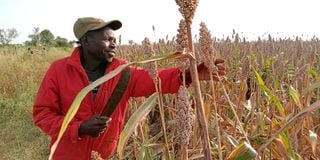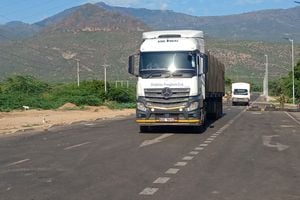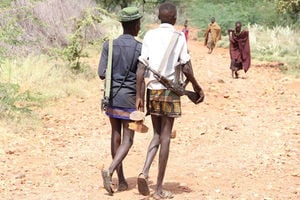
A farmer harvesting Sorghum at Chesang’atat/ Marich irrigation project in Sigor, West Pokot county on January 11, 2024.
It is early morning and the sun is rising on the horizon, casting golden petals of sunlight over the rich, vast and hilly Sigor area of West Pokot District.
Over the years, the early morning sunrise has provided the perfect time for nomadic pastoralists to graze their cattle in the Sigor fields.

A farmer harvesting Sorghum at Chesang’atat/ Marich irrigation project in Sigor, West Pokot county on January 11, 2024.
And beneath this scenic beauty that supports the nomadic lifestyle of the residents, there is yet another livelihood for these people: the cultivation of drought-resistant crops that largely make up their diet, sorghum.
Here one is met with images of scores of farmers busy on their farms, harvesting their crops.
The semi-desert villages that dot the Sigor area are slowly changing face as residents try to farm, inspired by the need to provide food and a balanced diet for their families, and although the practice is hampered by the hot and dry climate, impressive patches of drought-resistant sorghum, maize, vegetables and sweet potatoes can be seen here.
Joseph Limang'ole, who is among those harvesting their sorghum crop, is pleased with the progress.
"This village was bush and inaccessible. A lot of people were killed here during banditry, but a change of attitude has seen us using the fields for agriculture, with the harvest of such food, criminal activities associated with banditry will decrease as we now have a livelihood," he says.
His neighbour, Mr Joseph Lonyang'ole, is one of the pioneer farmers in Sigor who has now turned his two acres of land into a lush horticultural farm.
"Historically, as a community, we have never ventured into crop farming because we are used to pastoralism because our climatic conditions favour livestock, but now we are buying seeds that can perform well in our climate," he says.
What these West Pokot farmers may not know is that they are now practising climate-smart agriculture, and the turnaround is slowly increasing the region's food supply.
"We take maize seeds, known as sungura, to the seed company. Miracles are happening like in Egypt and Israel and there is food security," he says.
Mr Lonyang'ole, who is also the secretary of the Chesangartat community irrigation scheme, says this journey began in 2021.
He says their main challenge is water, given the climatic conditions in their region.
"We now have enough food for the communities here, we use traditional methods to store the surplus food for consumption as we wait for the next harvest season," he says.
In West Pokot County, women have not been left behind in the adoption of agriculture: Mercy Long'alio is now a maize and sorghum farmer, a practice she first tried last year.
"The familiar sound of guns firing in response to cattle rustling has ceased. People in this area rarely buy maize from other regions because we produce enough maize for our food needs, and when we have a surplus, we store some and sell some to make a living," she says.
She adds that many residents have slowly shifted from pastoralism to maize farming, which has reduced the incidence of banditry.
"I harvested about 1750 kilograms of sorghum in the last planting season. This project came to our rescue because my family was personally affected by hunger due to the prolonged dry spell over the years," she says.
Thanks to such impressive harvests, the communities here have since organised themselves into community groups to pool their resources to get better yields from their land, and the farmers have turned the once desolate land into a green oasis with bountiful harvests.
Matayo Tirono, the Senior Chief of Weiwei Location, points out that many businesses are now flourishing in the trading centres of the area.
"Markets have opened because of the peace. We do not have time to hunt animals. Many jobs have been created and young people have been employed," he said.







